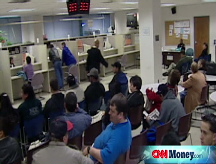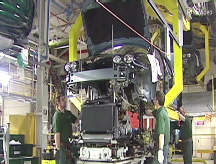Bush: Protect taxpayers in auto bailout
President, addressing recession and dismal jobs report, says he's 'concerned about viability' of Big Three.
NEW YORK (CNNMoney.com) -- On the heels of the worst job-loss report in more than 30 years, President Bush on Friday urged Congress to act next week to help the ailing Big Three automakers, but stressed they needed to do so in a way that protects the taxpayer.
"I am concerned about the viability of the automobile companies. I'm concerned about those who work for the automobile companies and their families," Bush said. "And likewise, I am concerned about taxpayer money being provided to those companies that may not survive."
He reiterated his stance that the money provided to them be taken from funds appropriated to the automakers last fall to help them make their cars more energy-efficient. Democrats have been calling on the Bush administration to draw the money from the $700 billion financial rescue package passed in October.
That's not the only disagreement between the White House and Capitol Hill. Pressure to pass measures to boost economic activity and cushion Americans against the downturn has been building for weeks in the wake of increasingly discouraging data and pessimistic sentiment surveys.
On Friday, the Bureau of Labor Statistics reported the economy lost 533,000 jobs - or close to double what economists were forecasting. The BLS commissioner testifying before the Joint Economic Committee characterized the report as "one of the worst" in the 124-year history of his agency.
President Bush signed an extension of unemployment benefits last month but to date has not supported a number of stimulus measures proposed by lawmakers - such as spending on infrastructure projects.
Following the president's statement, a White House spokesman told reporters that a stimulus plan is "something we expect to happen in the next administration" and that Bush's focus will be on the programs already implemented to stabilize the financial system and prevent avoidable foreclosures.
House Speaker Nancy Pelosi, D-Calif., on Friday again called on Bush to back at least a small stimulus package next week that would increase food stamp benefits and payments to states to help them fund Medicaid coverage, demand for which goes up when unemployment rises.
"Our economy cannot wait for a new President, a new Congress, or a new year to provide assistance to millions of Americans who have been ignored by the White House as the economy has steadily worsened," she said in a statement.
Whether or not any economic aid to individuals is passed this month, the expectation is that President-elect Barack Obama will sign a massive stimulus package when he takes office on Jan. 20, the estimated costs for which grow weekly.
The Bush administration has supported a stunning infusion of money into the financial system to jolt the credit markets to keep money flowing to Main Street through consumer and business loans.
On Friday, the president said the job loss numbers reflects the fact that the country is in recession, which was caused by trouble in the housing, credit and financial markets. "The most urgent issue facing the economy is the problem in the credit markets. ... And credit is beginning to move. ... There's still more work to do. But there are encouraging signs." (Two programs from the Fed in particular are helping to ease credit.)
While it is too soon to say definitively whether those financial rescue efforts will succeed, the Treasury and the Federal Reserve, which are running the various financial rescue initiatives, have come under harsh criticism from both sides of the aisle for poorly communicating their strategies. ![]()



